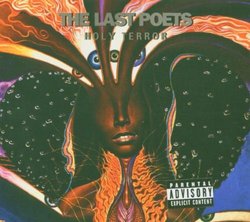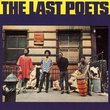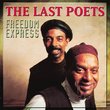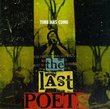| All Artists: Last Poets Title: Holy Terror Members Wishing: 1 Total Copies: 0 Label: Innerrhythmic Found. Release Date: 11/2/2004 Genres: Jazz, Special Interest, Pop, Rap & Hip-Hop, R&B Styles: Jazz Fusion, Poetry, Spoken Word & Interviews, East Coast, Old School, Pop Rap, Funk Number of Discs: 1 SwapaCD Credits: 1 UPC: 804699101723 |
Search - Last Poets :: Holy Terror
 | Last Poets Holy Terror Genres: Jazz, Special Interest, Pop, Rap & Hip-Hop, R&B
"The Last Poets were the first real hardcore rappers." --Ice Cube Those who believe that there are no second acts in American lives ought to consider the career of post-apocalyptic urban griots The Last Poets. Hailed for ... more » |
Larger Image |
CD DetailsSynopsis
Album Description "The Last Poets were the first real hardcore rappers." --Ice Cube Those who believe that there are no second acts in American lives ought to consider the career of post-apocalyptic urban griots The Last Poets. Hailed for the fiery intensity of their politics and their poetry from the moment they emerged in the late Sixties, The Last Poets spit forth a series of brilliant albums in the Seventies, split up and nearly guttered out in the Eighties, and reemerged in the Nineties into the embrace of a new generation of word-intoxicated rappers who recognize that the Poets' fire and intelligence are more necessary than ever. For the first time in over twenty years, original members Umar Bin Hassan and Abiodun Oyewole (aka Dune) reunited under The Last Poets banner and released Holy Terror, an album as vital and relevant as any work by the Poets in the 70's. Produced by Bill Laswell, Holy Terror features additional lyrics and vocals by Grandmaster Melle Mel, fat, funky grooves from Bootsy Collins and Bernie Worrell as well as a bonus remix track with guest vocals by George Clinton. Similar CDs
|
CD ReviewsMaybe they should have been called the First Poets Aaron Smith | 01/03/2002 (4 out of 5 stars) "The political rhetoric comes off as dated in tracks like Pelourinho, but that can be forgiven due to the rich blend of street funk, African percussions and oratory. That's right. Even if Bin Hassan's lyrics feel stale upon close examination, his rambling voice engulfs the ear. Unfortunately, none of this can save "Funk", a tired blend of pieces that don't fit. Bootsy Collins, Melle Mel, George Clinton and others collaborated on this album, but Funk sounds like the Poets were surprised so many artists agreed to contribute, so they had to be given something to perform and be given production credit. Remove this track and the album gets much better." Long-time players holding forth Tyler Smith | Denver, CO United States | 12/08/2004 (4 out of 5 stars) "Anyone who has had enough of today's well-worn hip-hop meditations on guns, women, jewelry and drugs should turn their attention to the Last Poets, who began delivering rhymes based on street rhythm and speech long before many of today's entertainers were born. "Holy Terror" reminds us that some performers still believe that art can be used to stimulate new modes of thought in the listener.
In their debut album in 1968, the Last Poets "rapped" over rhythms produced only on simple percussion instruments. On "Holy Terror," the backing is at times heavy organ- and guitar-based funk, as on "Homesick," "Funk" and "Black and Strong." Still, the words are the thing, and Umar Bin Hassan and Abidou Oyewole continue to produce poetry of the spoken word that goes far beyond mere rhyming. The main themes remain black pride, the need to know one's history, and challenges to society to correct corrosive social conditions, even as the words also insist every individual is to take responsibility for his or her own life. Of the two, Oyewole tends to be the more overtly political, while Oyewole concentrates on wedding poetic imagery to social themes. Hassan is particularly effective in laying down a challenge to present-day rappers in "Invocation" and in his stirring revival of a Brazilian slave-trading city, "Pelourinho." In "Black Rage," he paints a portrait of inner cities whose young residents are "bombs, waiting to explode." The portrait is complex. He clearly faults society for its indifference, but he also laments the waste of youthful energy that could be used to reshape society. Hassan is direct, strident and his words hit you between the eyes. As for Hassan, the only way to truly appreciate him is to listen to him (also check out his great solo effort, "To the Last".) His voice and spoken rhythms are like no one else's, and his poetry blends complex images with mocking humor and indignation, among other things. His world view is also surprisingly conservative at times, as in "Men-Tality," which decries lenient social mores and banal relationships based on sex alone. His best extended poetic trip is on "Homesick," which manages to sum up the historical challenges of African-Americans in a torrent of words, ideas and images. A listener new to the Last Poets would find, I think, a comparison of "Holy Terror" with their first album very rewarding. For those who love the spoken word, several purchases of their long list of recordings will surely follow." |

 Track Listings (11) - Disc #1
Track Listings (11) - Disc #1

